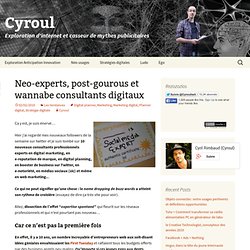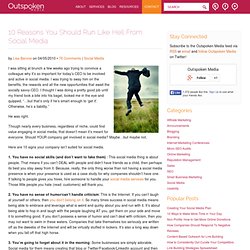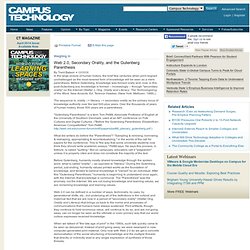

Bloggerrelations. Neo-experts, post-gourous et wannabe consultants digitaux. Ca y est, je suis énervé… Hier j’ai regardé mes nouveaux followers de la semaine sur twitter et je suis tombé sur 10 nouveaux consultants professionnels experts en digital marketing, en e-reputation de marque, en digital planning, en booster de business sur Twitter, en e-notoriété, en médias sociaux (sic) et même en web marketing...

Ce qui ne peut signifier qu’une chose : le name dropping de buzz words a atteint son rythme de croisière (essayez de dire ça très vite pour voir). Allez, dissection de l’effet “expertise spontané” qui fleurit sur les réseaux professionnels et qui n’est pourtant pas nouveau… Car ce n’est pas la première fois En effet, il y a 10 ans, un nombre incroyable d’entrepreneurs web aux soit-disant idées géniales envahissaient les First Tuesday et raflaient tous les budgets offerts par des business angels peu malins. Mais ça continue encore et encore… (C’est du Cabrel ça ?
Le résultat ? Seulement annonceur crédule, je vais t’avouer quelque chose : Vous aussi ?! Sur ce site: 10 Reasons You Should Run Like Hell From Social Media. I was sitting at brunch a few weeks ago trying to convince a colleague why it’s so important for today’s CEO to be involved and active in social media.

I was trying to sway him on the benefits, the rewards and all the new opportunities that await the socially savvy-CEO. I thought I was doing a pretty good job until my friend took a bite into his bagel, looked me in the eye and quipped, “…but that’s only if he’s smart enough to ‘get it’. Otherwise, he’s a liability.” He was right. Though nearly every business, regardless of niche, could find value engaging in social media, that doesn’t mean it’s meant for everyone. Here are 10 signs your company isn’t suited for social media. 1. 2. 3. 4. 5. 6. 7. 8. 9. 10. Those are some of the most common reasons I’ve seen for businesses that shouldn’t just avoid social media altogether. Web 2.0, Secondary Orality, and the Gutenberg Parenthesis. Weighing In Web 2.0, Secondary Orality, and the Gutenberg Parenthesis By Trent Batson03/05/08 In the large picture of human history, the brief few centuries when print reigned unchallenged as the most revered form of knowledge will be seen as a mere parenthesis.

Before Gutenberg, knowledge was formed orally and, now, in this post-Gutenberg era, knowledge is formed -- increasingly -- through "secondary orality" on the Internet (Walter J. Ong, Orality and Literacy: The Technologizing of the Word. New Accents. The sequence is: orality --> literacy --> secondary orality as the primary locus of knowledge authority over the last 500-plus years. "Gutenberg Parenthesis" is a term Tom Pettitt, Associate Professor of English at the University of Southern Denmark, used at an MIT conference on Folk Cultures and Digital Cultures. What did writers do before the "Parenthesis"?
About the Author.